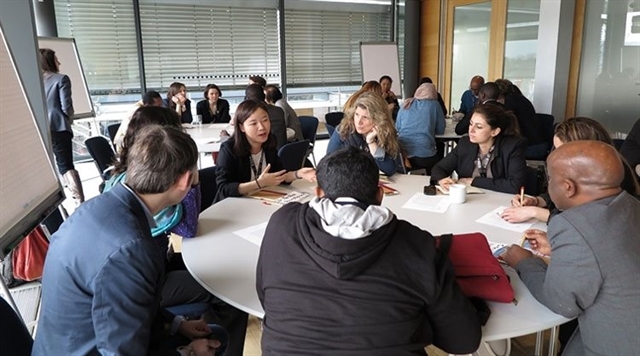 Society
Society

A new study of free-living soil nematodes co-authored by Vietnamese scientist Nguyễn Thị Ánh Dương was published ịn Nature – the world's leading multidisciplinary science journal.

|
| Nguyễn Thị Anh Dương (third, left) discusses with her foreign fellows at an international seminar on sustainable development in Bonn, Germany, 2018. — Photo Courtesy of Nguyễn Thị Ánh Dương |
HÀ NỘI — A new study of free-living soil nematodes
She has collaborated with 70 leading scientists in the field at 57 laboratories around the world to research and publish the work.
“Ecology research often focuses on visible parts of the ecosystem like large plants and animals, and overlooks tiny worms living in the soil, like nematodes. Despite their importance for ecosystems, few quantitative,
The study revealed that there are 57 billion nematodes for every single living human being
Nematodes play a significant role in the recycling of carbon, nutrients and minerals in the soil. Nematode abundance
“We hope this is the first in-depth study of the role and function of these small and sensitive soil animals that contribute to predicting future climate change,”
“Soil nematodes can be a tool for testing ecological hypotheses and understanding biological mechanisms in soil because of their central role in the soil food web and linkage to ecological processes.”
She hoped that with the results of the
“We hope this will help land managers make the right decisions in the fight to stop biodiversity loss and address climate change at a global level by identifying soil types that need to
For the study, researchers took 6,759 geo-referenced samples to generate a mechanistic understanding of the patterns of the global abundance of nematodes in the soil and the composition of their functional groups.
They used microscopes to analyse the density of each type of nematode and
During her time collecting samples and data on nematodes in
“I’ve seen lots of snakes and insects when collecting samples in the forests. But the hardest part was analysing the samples in the
She graduated as the valedictorian of the Department of Biology, Natural Resources and Environment under the
She got her PhD in Biology at the University of Cologne, Germany, then returned to work at the Nematology Department at the Institute of Ecology and Biological Resources of the
In 2017,




